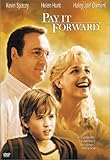Pay It Foward
The movie Pay It Foward was based on the book Pay It Forward.
Movie details for Pay It FowardThe movie was released in 2000 and directed by Mimi Leder. Pay It Foward was produced by Warner Home Video. More information on the movie is available on Amazon.com and also IMDb. Actors on this movie include Kevin Spacey, Helen Hunt, Haley Joel Osment, Jay Mohr, James Caviezel, Jon Bon Jovi, Angie Dickinson, David Ramsey, Gary Werntz, Colleen Flynn, Marc Donato, Kathleen Wilhoite, Liza Snyder, Jeanetta Arnette, Hannah Werntz, Tina Lifford, Loren D. Baum, Nico Matinata, Zack Duhame and Shawn Pyfrom. |
 |
While this could have turned into unmitigated schmaltz, the acting elevates this film to mitigated schmaltz. By turns powerful and measured, the performances of Spacey, Hunt, and Osment can't make up for the many missteps in a screenplay that sanitizes the look of the lower-middle class and expects us to believe that homeless alcoholics and junkies speak in the elevated manner of grad students. (Can that really be Angie Dickinson as Hunt's dispossessed mother? Yes, it is!) The germ of the story is a good one, though, and one may wonder how it would have been handled by the likes of Frank Capra, who could balance sentiment with humor. But clearly Capra would never have let the ending of his version to take the nosedive into cliché and pathos that director Mimi Leder has allowed in this film. More than a few viewers will also recognize that Leder has blatantly borrowed her final image from Field of Dreams, where its intended effect was more keenly and honestly felt. --Jim Gay
Book details for Pay It ForwardPay It Forward was written by Catherine Ryan Hyde. The book was published in 1999 by Pocket. More information on the book is available on Amazon.com. |
 |
Trevor, meanwhile, could use a little help himself. His father walked out on the family, and his mother, Arlene, is fighting an uphill battle with alcoholism, poor judgment in men, and despair. When the boy's new Social Studies teacher, Reuben St. Clair, arrives on the scene, Trevor sees in him not only a source of inspiration for how to change the world, but also the means of altering his mother's life. Yet Reuben has his own set of problems. Horribly scarred in Vietnam, he is reluctant to open himself up to the possibility of rejection--or love. Indeed, the relationship between Arlene and Reuben is central to the novel as these two damaged people learn to "pay forward" the trust and affection Trevor has given them.
Hyde tells her tale from many different perspectives, using letters, diary entries, and first- and third-person narratives from the various people whose lives Trevor's project touches. Jerry Busconi, for example, the addict Trevor tried to help, one night finds himself talking a young woman out of jumping off the Golden Gate Bridge:
I'm a junkie, Charlotte. I'm always gonna be a junkie. I ain't never gonna be no fine, upstanding citizen. But then I thought, hell. Just pay it forward anyway. Kid tried to help me. Okay, it didn't work. Still, I'm trying to help you. Maybe you'll jump. I don't know. But I tried, right? But let me tell you one thing. I woke up one morning and somebody gave me a chance. Just outta nowhere. It was like a miracle. Now, how do you know that won't happen to you tomorrow?Pay It Forward is reminiscent of Frank Capra's classic It's a Wonderful Life. Like the film, this novel has a steely core of gritty reality beneath its optimism: yes, one person can make a difference, can help to make the world a better place, but sickness, pain, heartache, and tragedy will still always be a part of the human condition. If at times Hyde stumbles a bit while negotiating the razor-thin line between honest feeling and sentimentality, it's generally not for long. And the occasional lapse into artificially colored emotion can be forgiven when weighed against the courage it takes to write so unabashedly hopeful a story in such cynical times. --Sheila Bright